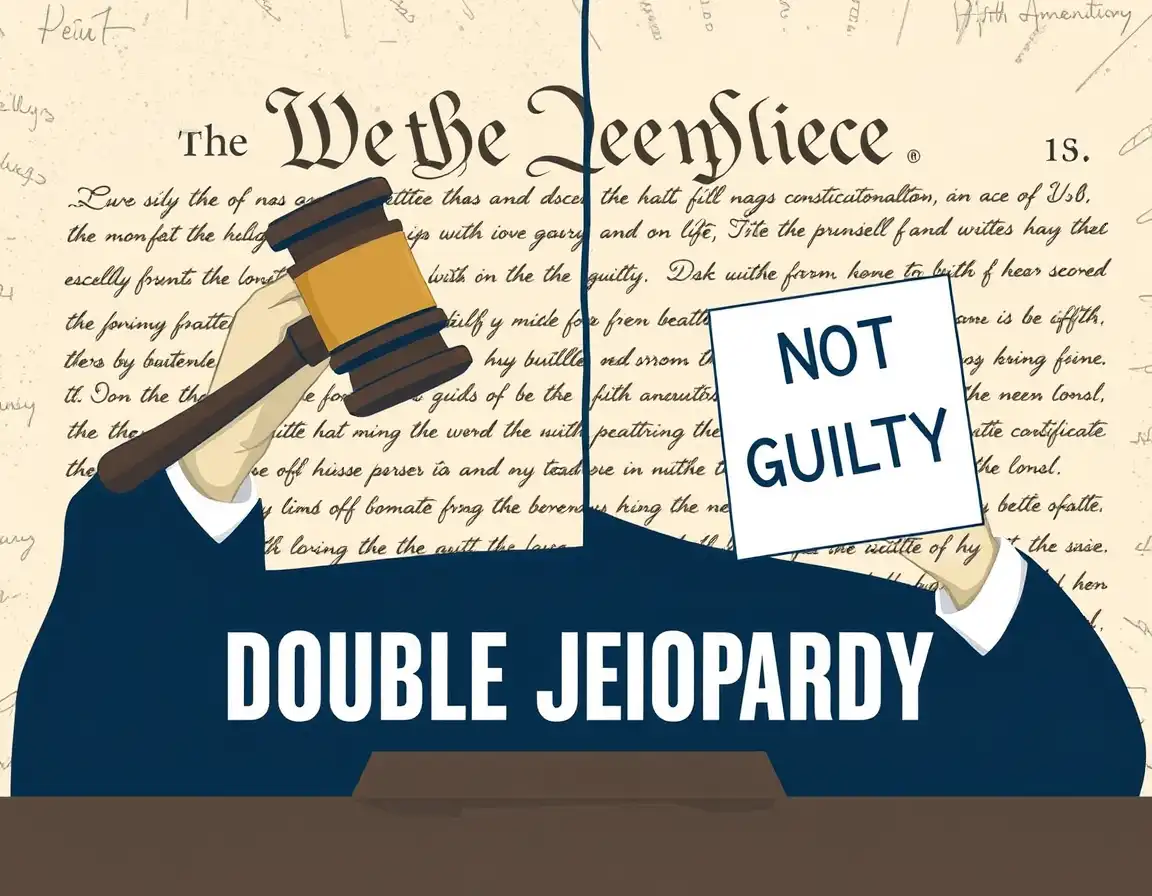One of the more highly regarded protections within the American criminal law realm, double jeopardy is enshrined in the Constitution in order to guarantee that people are not tried for the same crime more than once, thus securing the rights of the accused against the harm of unjust prosecution.
A better grasp of the meaning, limitations, and instances of application of double jeopardy can illuminate a defendant’s and the attorney’s ability to function within the justice system. So, let’s take a look at the working double jeopardy law and how they apply in terms of offered protection.
What is Double Jeopardy?
Double-jeopardy is a legal term that prevents a person from being legally tried for the same crime more than once. To explain in simpler terms, once a person has been either acquitted or convicted of a crime, the same government may not subject him to a second prosecution for that crime on the basis of the same material facts.
The idea behind double jeopardy is to protect individuals against incessant harassment by the other side due to prosecution. It is one basic tenet of the U.S. justice system assisting in guaranteeing fairness in an imperfect world and preventing abuse by prosecutors and law enforcement.
Double Jeopardy Definition in U.S. Law
In U.S. law, double jeopardy means that one can never be tried for the same crime again or penalized repeatedly for the same offense after trial. This is because there is only one chance given by the State to have a person convicted in any court of law. The meaning of double-jeopardy refers to:
- protection against a second trial after being acquitted
- protection against a second trial after being convicted
- protection against multiple punishments for the same offense
Where is Double Jeopardy Protected in the Constitution?
The double jeopardy amendment refers to the Fifth Amendment to the U.S. Constitution. This says:
“… nor shall any person be subject for the same offense to be twice put in jeopardy of life or limb …”
This principle is popularly known as the Double Jeopardy Clause and is the foundation of American constitutional law, originally applicable only in the federal sense; it was subsequently extended through the Fourteenth Amendment to compel its observance in state courts.
When Does Double Jeopardy Apply?
Double jeopardy is said to attach from the time she is put “in jeopardy.” Generally, jeopardy attaches when the jurors are sworn in, or in a bench trial, when the first witness is sworn in. Following acquittal or conviction of a case, the same person may not again be tried by the state in the very same case and under the same circumstances.
This rule applies only to criminal cases. It does not extend to civil suits, disciplinary measures, and appeals; nor may retrials occur on occasion, such as if a former trial ends in mistrial due to hung jury or procedural error.
What Double Jeopardy Does NOT Protect Against
Among many protections provided by double jeopardy are certain important exceptions. Some instances in which it does not apply are these:
- Civil lawsuits arising out of the same incident
- Different sovereigns (state and federal trials)
- Retrial after mistrial or appeal
- Probation or parole violations
- New evidence resulting in more charges
At its most basic level, double-jeopardy law does not bar every single type of action but merely assures that a defendant will, one way or another, be punished for the same crime only once – regardless of configuration – by the sovereign authority.
Another thing that should be learned is that a person cannot avoid his/her legal punishment inside administrative or civil proceedings as well because of the double jeopardy concept. To provide an example, the Department of Motor vehicles can easily suspend the drivers license even when a person is acquitted of a DUI case in the criminal court. On the same note, an individual acquitted in criminal court might also be subjected to a civil action bringing about damages. These similar systems are used in various legal effects and they are independent of the protection of the law of double jeopardy.
Examples of Double Jeopardy in Real Cases
Real-life instances help also explain the way double jeopardy works. In the most famous of the cases, a man who was acquitted of murder could never be reintroduced to a retrial-even with more evidence available because of the double jeopardy clause in the Constitution.
Another example involves the cases where the defendants were acquitted in the states but were later charged at the federal level for actions related to their state conduct but were claimed under different statutes. These are areas of great importance that determine the demarcation lines regarding the double jeopardy act and its application in multi-jurisdictional systems.
Double Jeopardy in Federal vs. State Courts
One of the most misunderstood aspects of double jeopardy is dual sovereignty doctrine. Under this rule, both the federal and state governments can prosecute an individual-the same person, in relation to the commission of the same act but in their own respective laws.
For example, a person who is acquitted in state court may have to defend against subsequent charges in federal court for the same act if it is in violation of both the state and federal laws. Such action is not violative of the double jeopardy amendment because each government is a sovereign separate and distinct sovereign authority.
Can You Be Tried Twice for the Same Crime?
In principle, it is prima facie that the person cannot be tried for the very offense twice within the same jurisdiction. There are some exceptions, however. Whereupon new facts arise, and some charges can be justified, the prosecution may be able to pursue a conviction with respect to a related but distinct crime.
In other words, should some criminal act violate state and federal law, they are free to pursue charges in their respective legal systems. The preventive argument of double jeopardy does not find application here; because the case against the accused is proceeding in two different jurisdictions.
Why Double Jeopardy Matters in Criminal Law
The importance of double jeopardy in criminal law cannot be overstated. It serves to protect against prosecutor overreach and reassure the defendant that any final determination made in respect to his or her case cannot be varied thereafter. If the rule against double jeopardy were not there, the prosecutor could subject a person to a series of endless retrials and appeal to a final verdict of conviction from the government, getting lucky after further attempts.
Fairness in this Constitution is thus ensured along with limiting the power of the state while providing for thorough and fair investigations. To sum up, double jeopardy ensures a solid foundation for justice-a one-time chance for the defendant to protect citizens from multiple threats of possible prosecution.





